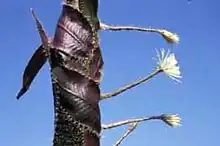Strophocactus
Strophocactus is a genus of cacti in the subfamily Cactoideae.[2] Its status and circumscription remain somewhat uncertain, with the genus containing one to three species (not always the same ones). Molecular phylogenetic data suggest that it consists of three species, including two formerly comprising the genus Pseudoacanthocereus. With this circumscription, the species have different growth habits, but share similarities in their flowers, which are white and open at night.
| Strophocactus | |
|---|---|
 | |
| Strophocactus wittii | |
| Scientific classification | |
| Kingdom: | Plantae |
| Clade: | Tracheophytes |
| Clade: | Angiosperms |
| Clade: | Eudicots |
| Order: | Caryophyllales |
| Family: | Cactaceae |
| Subfamily: | Cactoideae |
| Tribe: | Echinocereeae |
| Genus: | Strophocactus Britton & Rose[1] |
| Species | |
| Synonyms | |
| |
Description
As circumscribed by Korotkova et al. in 2017, the three species of Strophocactus have tubular to funnel-shaped flowers with tubercules arranged in ribs and areoles with bristles. The flowers are white and open at night. They are followed by yellow to brown fruits. Two species (S. brasiliensis and S. sicariguensis) are scrambling or decumbent shrubs, with thin stems (up to 4.5 cm across) and tuberous roots. S. sicariguensis sometimes has flattened stem segments. The third species, S. wittii, is an epiphyte with flattened stems that cling to the trunks of trees using aerial roots.[2][3]
Taxonomy
The genus was erected by Nathaniel L. Britton & Joseph N. Rose in 1913 with only one species, Strophocactus wittii.[1][4] In 1989, David Hunt reduced Stophocactus to a section of the genus Selenicereus, Selenicereus sect. Strophocactus,[1] so that the species became Selenicereus wittii. In 2003, Ralf Bauer proposed restoring the genus Strophocactus, adding two further species (S. chontalensis and S. testudo). He excluded Stophocactus from the Hylocereeae.[5] Bauer's actions were based on unpublished DNA sequence data. A molecular phylogenetic study of the Hylocereeae in 2017 showed that in neither Hunt's nor Bauer's approach were Strophocactus and Selinicereus monophyletic:[2]
| |||||||||||||
Selenicereus wittii formed a clade with two species then placed in Pseudoacanthocereus:[2]
| ||||||||||||||||||||
Accordingly, the authors followed Bauer in placing Selenicereus wittii back in Strophocactus, but now together with the two former Pseudoacanthocereus species. Like Bauer, they excluded the revised genus Strophocactus from the Hylocereeae, placing it in the tribe Echinocereeae.[2]
Species
According to Korotkova et al. in 2017, the genus has three species:[2]
| Image | Scientific name | Distribution |
|---|---|---|
| Strophocactus brasiliensis (Britton & Rose) S.Arias & N.Korotkova, syn. Pseudoacanthocereus brasiliensis (Britton & Rose) F. Ritter | Brazil | |
| Strophocactus sicariguensis (Croizat & Tamayo) S.Arias & N.Korotkova, syn. Pseudoacanthocereus sicariguensis (Croizat & Tamayo) N.P.Taylor | Colombia, Venezuela | |
 | Strophocactus wittii (K.Schumann) Britton & Rose, syn. Selenicereus wittii (K.Schumann) Rowley | North Brazil, Colombia, Ecuador, Peru, Venezuela |
Species formerly included in Strophocactus are:[2]
- Strophocactus chontalensis (Alexander) Ralf Bauer = Deamia chontalensis (Alexander) Doweld
- Strophocactus testudo (Karw. ex Zucc.) Buxb. ex Krainz = Deamia testudo (Karw. ex Zucc.) Britton & Rose
References
- "Strophocactus Britton & Rose", The International Plant Names Index, retrieved 2021-02-23
- Korotkova, Nadja; Borsch, Thomas & Arias, Salvador (2017), "A phylogenetic framework for the Hylocereeae (Cactaceae) and implications for the circumscription of the genera" (PDF), Phytotaxa, 327 (1): 1–46, doi:10.11646/phytotaxa.327.1.1
- Anderson, Edward F. (2001), "Pseudoacanthocereus", The Cactus Family, Pentland, Oregon: Timber Press, pp. 591–592, ISBN 978-0-88192-498-5
- "Strophocactus wittii Britton & Rose", The International Plant Names Index, retrieved 2021-02-23
- Bauer, Ralf (2003), "A synopsis of the tribe Hylocereeae F. Buxb.", Cactaceae Systematics Initiatives, 17: 3–63, cited in Korotkova, Borsch & Arias (2017)